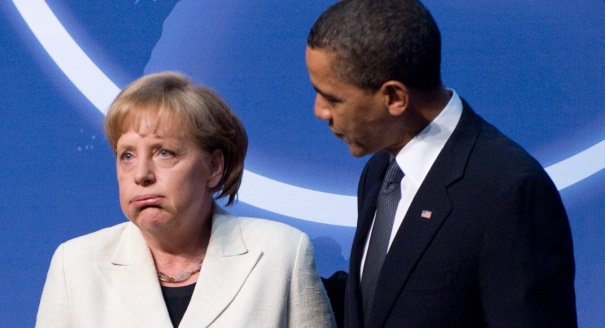U.S. President Barack Obama’s visit to Berlin this week is many things.
On the one hand, it’s a long overdue investment in one of America’s most important bilateral relationships. It’s a thinly veiled gesture of support for German Chancellor Angela Merkel in her campaign for reelection this September. And it’s an attempt to restore some of the old magic with Europeans who feel betrayed by the man who dared to ignore them on Guantanamo, drone warfare, and climate change.
But, on the other hand, Obama’s trip is also a desperate effort to find a partner in Europe with whom the United States can finally talk serious geopolitics. America is starting to realize that, even in the age of the pivot to Asia, it still needs Europeans to get stuff done on a global scale.
The United States needs Europe to establish a transatlantic free trade area, the geopolitical goal of which is to preserve some of the West’s global preeminence. It needs Europe in the Middle East to resolve the Iran and Israel-Palestine questions, and to have some kind of consolidated approach to Syria. It needs Europeans to invest their fair share in the defense burden-sharing scheme called NATO, America’s only semifunctioning multilateral alliance. And it needs Europe to reinvent the institutions that govern the liberal world order: the G20, IMF, World Bank, and perhaps even the UN.
The problem is that America feels increasingly uneasy about its two traditional geopolitical counterparts in Europe, France and the UK. U.S. diplomats say this behind closed doors with shocking directness. France is well on the way to ruining itself economically, jettisoning any claim to geopolitical relevance. France’s largely irrelevant nuclear arms and UN veto power just don’t cut it any more as the country loses its panache.
The same goes for Britain, which is hemorrhaging military capabilities and is firmly in the grip of a Little England spasm that neuters the country’s otherwise magnificent strategic culture.
So Obama is left with Germany, the “reluctant hegemon.” That’s not a fun position to be in because it’s highly unlikely that Germany will turn into the kind of player that the United States wants and needs. As former German foreign minister Joschka Fischer stated last week with his trademark pessimism at the Wrocław Global Forum: “Don’t expect that strategic leadership will come from Germany. This is not only a problem of the present coalition. It would not change even if the opposition took over.”
The musings about why this is the case are plentiful. History, laziness, isolationism, provincialism, an allergy to all things military—all of these play a role and are well-documented. But there is one factor that is often overlooked, despite its huge importance in this context: the very nature of strategic decisionmaking, which runs counter to all postwar German instincts.
After World War II, Germans, for very good reasons, developed an insatiable desire to be on the right side of things. Nothing was more sought after than moral clarity on whatever issue might pop up. But in foreign policy—and especially on questions of war and peace—moral clarity is rarely to be had. In this policy field, decisionmakers must often choose between two (or more) deeply unsatisfactory paths of action. Just look at the current agonizing over whether to intervene in the Syrian civil war.
More than in any other country, German politicians have a profound uneasiness about making a judgment call on issues where staying “morally clean” isn’t an option. The outcome of this discomfort is avoidance—as demonstrated impressively during the UN Security Council vote on Libya, when Germany abstained.
This avoidance has become the key feature of the German foreign and security policy debate. German dodging has always been a nuisance in Europe. Now, with Germany as Europe’s indispensable nation—and with Europe’s erstwhile strategy champions lost in self-absorption—Germany’s evasion has become a geopolitical problem. More than that, it is a scandal. And it won’t end anytime soon. Germany, Europe’s swing state, prefers to continue its strategic slumber.
Obama will get his fair share of German avoidance this week. Europeans have fallen out of love with him, and not only because he continued some of the policies of his despised predecessor. It’s also because he is knee-deep in the morally unsatisfying mud of international politics. Observers are disappointed because he turned out to be Obama the president of the United States, not Obama the political redeemer. He was stained by the necessities of his job.
And so Europe’s drift continues. The big three member states are strategically absent, the EU’s own foreign policy institutions are weak, and the rest of the world is going into geopolitical hyperdrive. In short, Europe is falling behind. When even Russia, that faux giant, looks strong by comparison, you know it’s bad.
Obama is right to invest in Europe. He is right to devote special attention to Germany. But he should not expect any immediate return on his investment. If his speech in front of the Brandenburg Gate alerts just a few Germans to the dire state of global affairs, the president’s efforts will already have been a success.


-2.png)

.png)

.png)